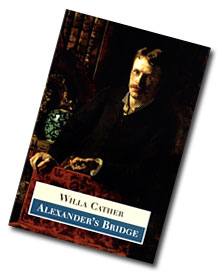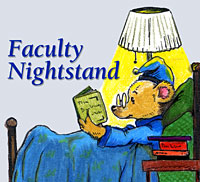UC Berkeley Web Feature
 |
Steve Tollefson surrounded by the spines of his friends. (Peg Skorpinski) |
Faculty Nightstand: Steve Tollefson plugs the holes in his reading CV
|
BERKELEY – Not surprisingly, UC Berkeley writing and grammar guru Steve Tollefson has a tower of tomes sitting next to his bed at all times — only on the floor, he says, not his nightstand.
Tollefson, who directs the campus's Writers at Work series, oversees the freshman Summer Reading List, teaches college writing, and heads the Office of Educational Development, is a passionate reader. Reluctant to pick just a current favorite to describe, he's offered a veritable buffet of recommendations for Faculty Nightstand.
Read something you'd like to share? Don't wait to be invited — e-mail us.
Steve Tollefson, lecturer,
College Writing Programs:
For
about a year, I've been catching up on the novels
I never got to in college — books that I always sort
of pretended to have read; you know, nodding
and smiling and then quickly turning the conversation
to another book by the same author, or when possible,
referring to the movie as if I'm making a comparison.
Almost every one of these books has been a joy to read: Wallace Stegner's "The Big Rock Candy Mountain," Frank Norris's "The Octopus," Sinclair Lewis's "Babbitt," Jack London's "The Sea Wolf," Upton Sinclair's "The Jungle," Harriet Beecher Stowe's "Uncle Tom's Cabin," and Willa Cather's "Oh! Pioneers," to name just a few. I know, I know, it's horrifying that someone my age hadn't already read these — but it's been a lot of fun playing catch-up. And I think all of these are amazing books.
Here are two that stand out for me:
Alexander's Bridge
Willa Cather
1912
 "Alexander's Bridge" is Willa Cather's first
novel, and a very surprising find for a Cather lover.
"Alexander's Bridge" is Willa Cather's first
novel, and a very surprising find for a Cather lover.
There are no wide open spaces or wheat fields or hearty immigrants. It's set in Boston, New York, and London for the most part, and the people are well-heeled and sophisticated. Bartley Alexander, an engineer famous for his bridges, is in the middle of building an extraordinary bridge in Canada: "There were other bridge-builders in the world, certainly, but it was always Alexander's picture that the Sunday Supplement men wanted, because he looked as a tamer of rivers ought to look." He's happily married to Winifred, clearly a Boston type of "good breeding." It's unfortunate that on the back of the edition I read she is referred to as "cold," because she is decidedly not cold. On a business trip to London, Bartley reconnects with the great love of his youth, now a successful actress, and that's where I'll end the plot summary.
What's remarkable about this book is that no one is bad; it's just that we complicate our lives. That even when things are good, there are longings that we sometimes give into, mistakes we make. In that sense, this seems a more modern book than Cather's later, more familiar works. And unlike those books, "My Antonia" for instance, this is not a sweeping novel; it's short and contained, with a more narrow focus. But like the other books, the prose here is clear and direct. It really seems more like a book by Henry James or Edith Wharton, and the critics are not always kind to it. In fact, in the preface to the second edition (1922), 10 years after the initial publication, Cather herself implies that it's not a very good book. But I thoroughly enjoyed it.
The Octopus
Frank Norris
1901
I just want to put in a short, special word for "The Octopus" by Frank Norris. Set in the Central Valley but with some nice turns in San Francisco, it's the story of the Evil Railroad and the (mostly) good farmers. It does make you loathe Big Business — sorta makes you feel young again! — but the main reason I want to suggest it is because it's really essential reading for those interested in California as a place. As I read it, I could see clearly that one of its great-grandchildren would be Joan Didion's "Slouching Towards Bethlehem."
Lost books: Titles that Tollefson thinks have unjustly fallen off the radar
- "Earth
Abides," George R. Stewart: Post-apocalyptic
life in the Bay Area, complete with ecology and pandemics
— but written in the '40s. (Stewart was a UC
Berkeley professor of English.)
- "Storm," George R. Stewart:
The "natural
history" of a major Pacific Storm that hits
Northern California.
- "The Ninth Wave," Eugene Burdick: Surfers,
California politics, the new science of public opinion
polls. (Read Tollefson's
essay
about this book, by a UC
Berkeley professor of political science, for the
Berkeley Daily Planet.)
- "The Sibyl," Par
Lagerkvist: The wandering Jew meets one of the women
who was the Oracle of Delphi. With goat gods, weird
children, and philosophy. Sally Field is not involved.
- "The Encantadas," or Enchanted Isles, Herman Melville:
Novella — one story for each of the Galapagos Islands.
- "Saint Manuel the Good, Martyr," Miguel de Unamuno: Novella about a priest who no longer believes but continues for the sake of his parishioners.


